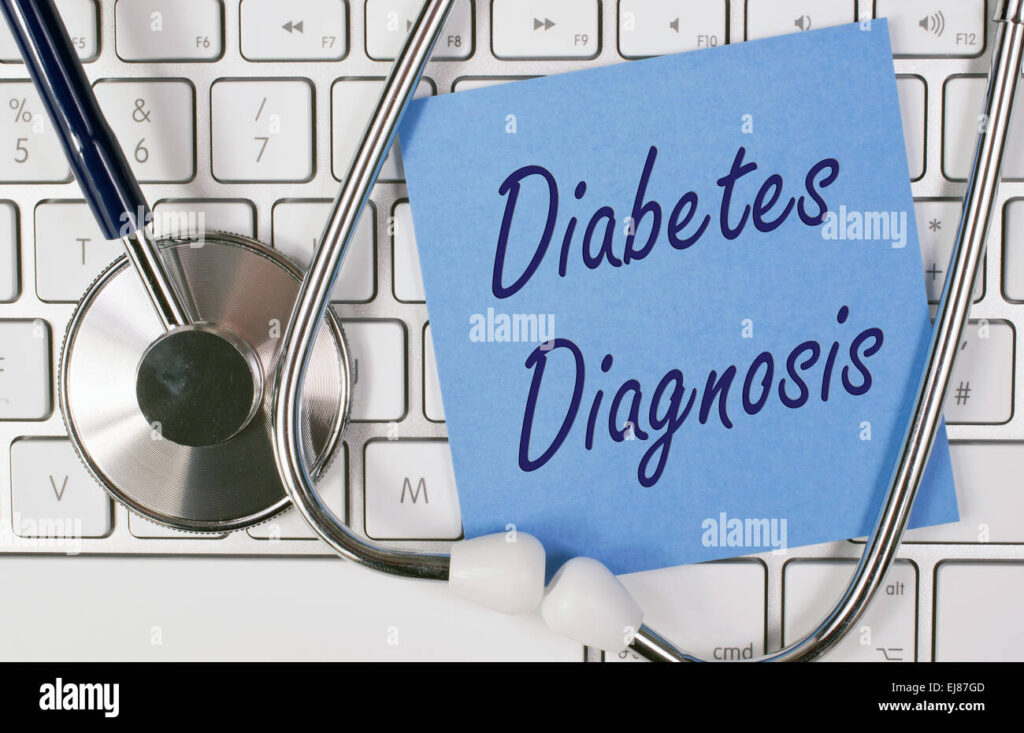Diabetes Diagnosis: Tests, Screening, and What to Do Next
Share IT

Launch Your Dream Website with Us!
Click Here to Get in touch with Us.
Categories
Diabetes Diagnosis
Revealing the Reality: Diabetes Diagnosis and Screening Tests
A illness marked by elevated blood sugar levels, diabetes mellitus affects millions of people worldwide. Serious consequences can be avoided by detecting the condition early. This blog post explores diabetes diagnosis and screening procedures, giving you the tools you need to manage your health.
Thank you for reading this post, don't forget to subscribe!Table of Contents

The Value of Early Detection: The Significance of Diagnosis
Diabetes Diagnosis
Diabetes that is not under control can cause a number of other health issues, including heart disease, stroke, kidney failure, nerve damage, and eyesight loss. However, these consequences can be greatly decreased with early detection and appropriate therapy. This is why prompt diagnosis is essential:
- Early Intervention: By managing blood sugar levels right away, early identification helps stop additional damage.
- Decreased Complication Risk: Getting well after treatment can greatly lower the chance of long-term problems.
- Better Quality of Life: A healthier, more active life can result from good diabetes management.
The Equipment of the Trade: Typical Diagnostic Examinations
Diabetes Diagnosis
Diabetes can be definitively diagnosed with a number of blood tests. These assays evaluate blood sugar levels at various intervals:
- The Fasting Plasma Glucose (FPG): test gauges blood sugar levels following an 8-hour or longer overnight fast.
- Regardless: of when you last had food, the Random Plasma Glucose (RPG) test analyses blood sugar at any time of day. If you have severe symptoms that point to diabetes, you might use it.
- Oral Glucose Tolerance Test (OGTT): This test involves consuming a sweet drink, followed by blood sugar measurements at certain intervals (typically before fasting, one hour after, and two hours after).
Analysis of the Findings:
Diabetes Diagnosis
There are particular diagnostic standards for diabetes for each test. A medical expert will, however, interpret your results in light of your symptoms and medical history.
Extra Examinations:
Diabetes Diagnosis
HbA1c, or haemoglobin A1c: This test gives an overview of the typical blood sugar management for the previous two to three months. Although it isn’t utilised for initial diagnosis, it can be useful for tracking the management of diabetes.
To whom does screening apply? Recognising High-Risk Persons
Diabetes Diagnosis
The following categories should get screened for diabetes, according to the American Diabetes Association (ADA):
- Adults over 40 (particularly those with a history of diabetes in their families)
- Adults that are overweight or obese
- Women who had gestational diabetes while expecting
- Adults suffering from specific medical disorders, such as hypertension or hypercholesterolemia
Diagnostics vs. Screening: Understanding the Distinctions
Diabetes Diagnosis
The purpose of screening tests is to find those who are at risk of acquiring diabetes. They might not be the final word in a diagnosis.
- Positive Screening Test: A confirmatory diagnostic test will be required if the results of the screening test are abnormal.
- Negative Screening Test: The absence of diabetes is not always ensured by a negative screening test. Even in cases where an initial test result is normal, high-risk patients should undergo routine checkups and repeat tests.
Moving Forward: Next Steps Following Diagnosis
Diabetes Diagnosis
In the event that diabetes is identified, your physician will collaborate with you to create a customised care strategy. Usually, this plan consists of:
- Diet and Exercise: Two essential components of diabetes management are dietary adjustments and consistent physical activity.
- Medication: To control blood sugar levels, you may require insulin or oral drugs, depending on the severity of your diabetes.
- Blood Sugar Monitoring: By keeping a regular eye on your blood sugar levels, you may assess your progress and modify your treatment plan as necessary.
Diabetes Diagnosis
You can take charge of your health by being informed about common screening tests and realising how important diagnosis is. You can properly control your diabetes and lead a full and healthy life if you receive early detection.

Launch Your Dream Website with Us!
Click Here to Get in touch with Us.





























































Recent Comments